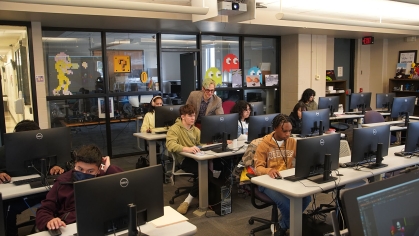Researcher Offers World Mental Health Day Tips to Help Kids SOAR
As World Mental Health Day approaches on Oct. 10, Charlotte Markey cautions that tweens and teens – already vulnerable to mental health issues due to a mix of biological and social factors – have faced an especially difficult time during the COVID-19 pandemic. 
“The pandemic has disrupted some of the normal support structures for kids,” says the Rutgers University–Camden researcher. “In schools, many teachers, counselors, and nurses are focused on COVID-related matters and have less time to focus on anything else. The pandemic has also created uncertainty and heightened anxiety for many people.”
Despite these added challenges, says the professor of psychology, time is still of the essence. Mental health issues left untreated during adolescence, she explains, do not typically resolve on their own. Instead, they have the potential to become long-term, chronic, and more serious problems in adulthood.
To that end, Markey – author of the book The Body Image Book for Girls: Love Yourself and Grow Up Fearless (Cambridge University Press) and the forthcoming Being You: The Body Image Book for Boys – offers a few positive mental health tips that will help children SOAR:

Charlotte Markey. Photo by Caryn Schwartz.
S, Social media purge: According to Markey, research indicates that social media use can be detrimental to teens’ mental health. However, it does depend a great deal on how kids are using social media.“Eliminating potentially nefarious influences on social media – for example, by purging some influencers – can make social media use a more positive experience for teens,” she says.
O, connect with Others: Markey explains that all people need connections with others, and this is especially important during the teen years. The pandemic, she notes, has disrupted many teens’ lives and their ability to participate in typical teenage activities such as athletics and dances.“It is important for teens to connect in the ways that they can, and maintain some close friendships,” she says.
A, Advocate for yourself and get professional help when you need it: Markey says kids should be taught that admitting when they could use some help or support is not a sign of weakness, but of courage.“The pandemic has led to a dramatic increase in youths’ mental health problems, including eating disorders and anxiety,” she says. “Treatment for these problems is important so that teens can head into adulthood on the right track.”
R, Rest and relax: The Rutgers–Camden researcher explains that, according to the Centers for Disease Control and Prevention, tweens need 9 to 12 hours of sleep per night and teens need 8 to 10 hours of sleep per night.“This means that many kids are not getting the amount of sleep they need to maintain good health,” she says.
For more information on helping adolescents meet social, emotional, and mental well-being challenges during the COVID-19 pandemic, Markey encourages parents to visit the Centers for Disease and Control Prevention website.


